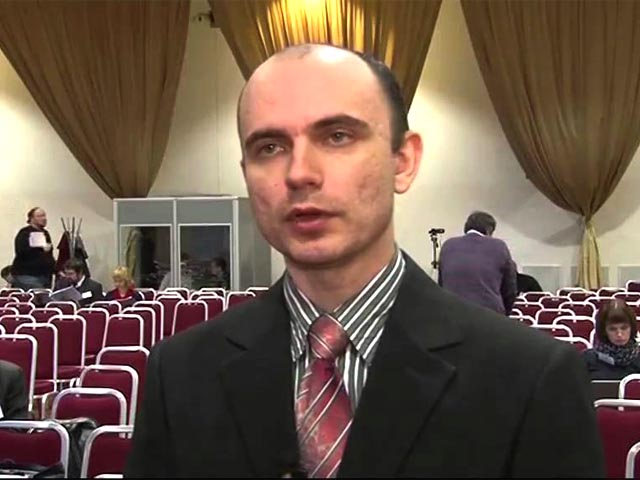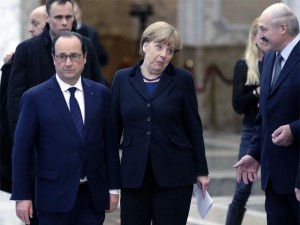Poland and Germany were both initiators and drivers of a New Eastern policy linked to the Eastern neighborhood and Russia/Soviet Union.
Andrei Kazakevich: Belarus’ expert community needs to step out of isolation

In Lithuanian Kaunas, 6th International Congress of Belarusan Studies has ended.
About 500 people attended the event. Within the three days, from October 8-10, the latest relevant research on political and social issues were discussed.
Andrei Kazakevich, the director of the Political Sphere Institute of Political Studies and the Chair of the Congress Organizing Committee, shared the results of the Congress with the EuroBelarus Information Service:
— First of all, we planned the Congress as an open platform for discussing current research and their results. The Congress provides our society with more open research results and makes academic community qualified, as well as enriches Belarusan culture. First of all, it should be noted that the Congress gives a clearer understanding of what is happening in Belarus. And, of course, promotes, if I may say so, certain people, who, in situation of absence of decent spaces in Belarus would simply remain invisible and would only be known to a narrow circle of experts.
— If such events are of great importance, why they are not organized in Belarus? And is one Congress enough?
— In Belarus, indeed, nothing like this happens. Unfortunately, because of a certain political situation, we cannot be sure about the safety and the possibility of a broad and uncensored discussion, which is available in Kaunas. It’s hard to say why else.
— How do you assess the current work of the Congress?
— The work has been extremely successful. We hosted many participants from different countries of the world. A third part of all the guests were foreigners and two-thirds were from Belarus. According to panel coordinators and researchers, discussions of narrow topics were extremely interesting. We are pleased that we have given researchers this opportunity, and hope that the materials of the discussions and presentations will be available for wide use in the media and on the Internet.
— This is the sixth Congress already — do you think that the political research has changed over this time?
— Indeed, over the past 5 years, much has changed. A number of research institutions and initiatives have been founded. We see that a new generation of analysts is growing. Expert community now looks stronger and more united; a wider range of problems is raised. On the whole, it should be noted that the Congress of Belarus researchers fosters the Belarusan expert community and expands its influence.
— Have you considered that the Congress will become that big over the years?
— Initially we hoped to launch small meetings for 50-100 persons. But with every year a growing number of researchers have been submitting their applications and abstracts for participation. Therefore, we can say that the Congress is constructed due to the need, not out of some well-established plan.
— You mentioned that special attention at the Congress was given to the research of Russian foreign policy and the situation in Eastern Europe.
— This issue is of concern for absolutely everyone now. The region recovers from the shock that began two years ago. New rules and security system should be built. Discussion of these aspects is important for the formation of expert opinion and its further impact on the foreign policy in the region.
— What else would you mention?
— Particularly impressive were the reports of Ananka and Parotnikau regarding weapons and the status of the Belarusan defense industry. The study of the post-Soviet area and disintegration processes in the region, the processes of cooperation, trade and economic partnership was extremely interesting. In general, we can say that now long-term strategies get increasingly smaller value in the region. This means that the processes of European and Eurasian integration have less impact on narrow interests.
Others
-
Uladzimir Matskevich: The sooner the "Union State" is denounced, the better for Belarus
Not only does the “Union State” undermine the establishment of civilized relations with Europe, but it hinders the possibility of normal relations between Belarus and Russia.
-
Uladzimir Matskevich: The regime can no longer control the situation in the country
The authorities are unable to prolong the social contract with the people: there is no way out of the social crisis.
-
Press release of the BNP in connection with the next round of the dialogue in the format of the EU-Belarus Coordination Group
Belarusan National Platform of the Eastern Partnership Civil Society Forum welcomes the dialogue process in the format of the EU-Belarus Coordination Group, the third round of which was held in Minsk on 3-4 April 2017.
-
Hennadiy Maksak: Europe must react adequately to the events in Minsk
A new wave of political repressions should make the EU return to tougher policy towards the Belarusan regime.








Comments
From farewell to a new Eastern policy and towards a new development
Poland and Germany were both initiators and drivers of a New Eastern policy linked to the Eastern neighborhood and Russia/Soviet Union.